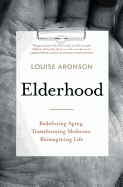
For many, old age is a far-off concern shuffled to the back of their minds, where it distorts under the societal obsession with youth and beauty. For Louise Aronson, thoroughly accomplished in both the medical (American Geriatrics Society Geriatrician of the Year) and literary (A History of the Present Illness) fields, aging and the elderly are her passion. In Elderhood: Redefining Aging, Transforming Medicine, Reimagining Life, she gathers roughly three decades of case histories, criticism, curiosity and wisdom to offer readers a holistic, compassionate understanding of the third stage of life: elderhood.
From the beginning, Aronson is quick to point out how limited the dominant cultural understanding of old age is, as it distinguishes between the "successful aging" of some while bemoaning the illness and disability of others. She exposes the default of ageism again and again in her meticulous consideration of medical and family networks, political policy, municipal oversights, capitalist ambition and nearly every other sector of life that comes in contact with (or at the expense of) the elderly.
Older bodies aren't simply longer-lived versions of younger ones, just as adult bodies aren't simply bigger versions of children's. In Aronson's paradigm, each stage of life (childhood, adulthood, elderhood) requires a certain style of attention key to a person's quality of living. Elderhood, like the life station it studies, is dynamic, multifaceted and full of wonder. Aronson's writing flexes with vibrant energy as she discusses the ways she has seen the healthcare system neglect the overall well-being of her patients, her colleagues and herself.
Intimidating as it may seem, elderhood becomes welcoming and generous in Aronson's deft care. --Dave Wheeler, associate editor, Shelf Awareness

